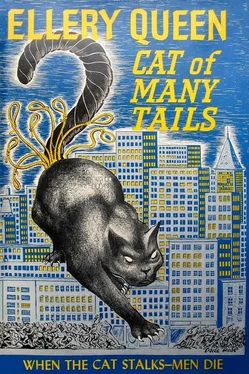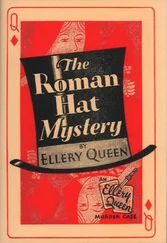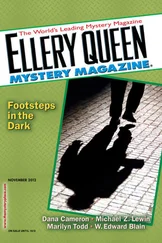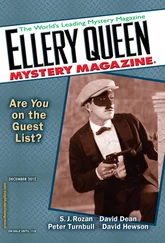“—no, I’m positive he didn’t know anybody of that name,” Mrs. Katz was saying. Inspector Queen was being perversely insistent about Howard Whithacker, who had disappointed the psychiatrists. “Unless, of course, this Whithacker was somebody Donald met in training camp.”
“You mean during the war?” asked the Inspector.
“Yes.”
“Your son in the war, Mrs. Katz? Wasn’t he too young?”
“No. He enlisted on his eighteenth birthday. The war was still on.”
The Inspector looked surprised. “Germany surrendered in May, I think it was, of 1945 — Japan in August or September. Wasn’t Donald still 17 in 1945?”
“I ought to know my own son’s age!”
“Pearl.” Dr. Katz stirred in his corner. “It must be that driving license.”
The Queens both made the slightest forward movement.
“Your son’s license, Dr. Katz,” said Inspector Queen, “gives his birth date as March 10, 1928.”
“That’s a mistake, Inspector Queen. My son made a mistake putting down the year on his application and never bothered to have it corrected.”
“You mean,” asked Ellery, and he found himself clearing his throat, “you mean Donald was not 21 years old, Dr. Katz?”
“Donald was 22. He was born on March 10, 1927.”
“22,” said Ellery.
“22?” The Inspector sounded froggy, too. “Ellery. Stella Petrucchi.”
Abernethy, 44. Violette Smith, 42. Rian O’Reilly, 40. Monica McKell, 37. Simone Phillips, 35. Beatrice Willikins, 32. Lenore Richardson, 25. Stella Petrucchi, 22. Donald Katz ... 22.
For the first time the diminishing-age sequence had been broken.
Or had it?
“It’s true,” Ellery said feverishly in the hall, “it’s true that up to now the age drop’s been in years. But if we found...”
“You mean this Katz boy might still be younger than Stella Petrucchi,” mumbled his father.
“In terms of months. Suppose the Petrucchi girl had been born in January of 1927. That would make Donald Katz two months younger.”
“Suppose Stella Petrucchi was born in May of 1927. That would make Donald Katz two months older.”
“I don’t want to think about that. That would... What month was she born in?”
“I don’t know!”
“I don’t remember seeing her exact birth date on any report.”
“Wait a minute!”
The Inspector went away.
Ellery found himself pulling a cigaret to pieces. It was monstrous. Fat with meaning. He knew it.
The secret lay here.
But what secret?
He tried to contain himself as he waited. From somewhere he heard the Inspector’s voice, in tones of manhood. God bless the shade of Alexander Graham Bell. What secret?
Suppose it turned out that Donald Katz had been older than Stella Petrucchi. By so little as one day. Suppose. What could it mean? What could it mean?
“Ellery.”
“Well!”
“March 10, 1927.”
“What?”
“Father Petrucchi says his sister Stella was born on March 10, 1927.”
“The same day?”
They glared at each other.
Later they agreed that what they did was reflexive; on its merits it promised nothing. Their inquiry was a sort of conditioned response, the detective organism reacting to the stimulus of another un-comprehended fact by calling into play the nerves of pure habit. The futility of any conscious consideration of the identical-natal day phenomenon was too painfully apparent. In lieu of explanation — even of reasonable hypothesis — the Queens went back to fundamentals. Never mind what the fact might mean; first, was it a fact?
Ellery said to his father, “Let’s check that right now,” and the Inspector nodded and they went down into West 81st Street and climbed into the Inspector’s car and Sergeant Velie drove them to the Manhattan Bureau of Vital Records and Statistics of the Department of Health.
Neither man uttered a sound on the ride downtown.
Ellery’s head hurt. A thousand gears were trying to mesh and failing to do so. It was maddening, because he could not rid himself of the feeling that it was all so very simple. He was sure there was a rhythmic affinity in the facts but they were not functioning through a silly, aggravating failure of his perceptive machinery.
Finally, he shut the power off and was borne blank-minded to their destination.
“The original birth certificates,” said Inspector Queen to the Registrar of Records. “No, we don’t have the certificate numbers. But the names are Stella Petrucchi, female, and Donald Katz, male, and the date of birth in each case is, according to our information, March 10, 1927. Here, I’ve written the names down.”
“You’re sure they were both born in Manhattan, Inspector?”
“Yes.”
The Registrar came back looking interested. “I see they were not only born on the same day, but—”
“March 10, 1927? In both cases?”
“Yes.”
“Wait, Dad. Not only born on the same day, but what?”
“But the same doctor delivered them.”
Ellery blinked.
“The same... doctor delivered them,” said his father.
“May I see those certificates, please?” Ellery’s voice was cracked again.
They stared at the signatures. Same handwriting. Both certificates signed:
Edward Cazalis M.D.
“Now, son, let’s take it easy,” Inspector Queen was saying, his hand muffling the phone. “Let’s not jump. We don’t know a thing. We’re just bumbling around. We’ve got to go slow.”
“I’ll go as I damn please. Where’s that list?”
“I’m getting it. They’re getting it for me—”
“Cazalis, Cazalis. Here it is! Edward Cazalis. I told you it was the same one!”
“He delivered babies? I thought—”
“Started his medical career in the practice of obstetrics and gynecology. I knew there was something queer about his professional history.”
“1927. He was still doing O.B. work as late as 1927?”
“Later! Here. It says—”
“Yes, Charley!”
Ellery dropped the medical directory. His father began writing as he listened. He wrote and wrote. It seemed as if he would never stop writing.
Finally, he did.
“Got ’em all?”
“Ellery. It just isn’t reasonable that all of them—”
“Would you please get the original birth certificates,” Ellery said, handing the Inspector’s paper to the Registrar, “of the people listed here?”
“Dates of birth...” The Registrar ran his eye down the list. “All Manhattan born?”
“Most of them. Maybe all of them. Yes,” said Ellery. “I think all of them. I’m sure of it.”
“How can you be ‘sure’ of it?” snarled his father. “What do you mean, ‘sure’? We know about some of them, but—”
“I’m sure of it. All born in Manhattan. Every last one. See if I’m wrong.”
The Registrar went away.
They kept walking around each other like two dogs.
The clock on the wall crept along.
Once the Inspector said in a mutter: “This could mean... You know this could mean...”
Ellery turned around, baring his teeth. “I don’t want to know what this ‘could’ mean. I’m sick of thinking of ‘possibilities.’ First things first, that’s my motto. I just invented it. One thing per time. Step by step. B follows A, C follows B. One and one make two, and that’s the limit of my arithmetic until I have to add two more.”
“Okay, son, okay,” said the Inspector; after that he muttered to himself.
And then the Registrar came back.
He was looking baffled, inquisitive, and uneasy.
Ellery set his back against the office door. “Give it to me slowly, please. One at a time. Start with Abernethy. Abernethy, Archibald Dudley—”
Читать дальше












